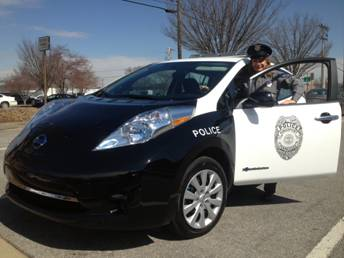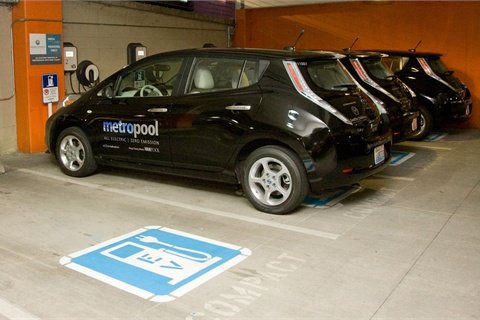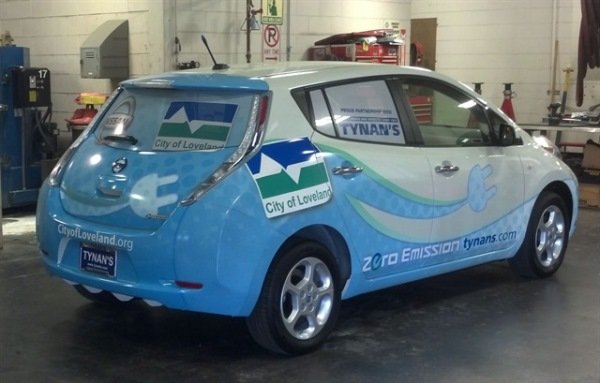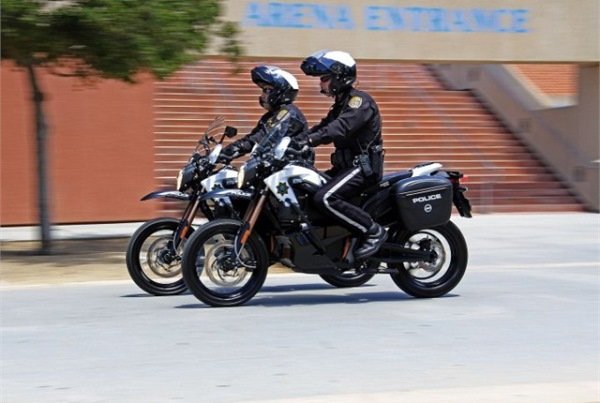
LEAF as police car?
We recently learned of this Kingsport Tennessee police department LEAF. To their knowledge, it is the first all electric fully marked police vehicle used in the country. This LEAF will be used in the Code Enforcement Division – a perfect use of the LEAF’s capabilities. In service for about a month, this is the third LEAF for the city. The Water Department and the fleet motor pool house the other two electric vehicles (EVs). The city of Kingsport also has over 30 hybrid vehicles for employee use. This got us wondering about the prevalence of alternative fuel – especially electric – vehicles being used in government fleets.
Electric vehicles in government fleets throughout the country
Interestingly, in the heart of oil country, one of the first cities to adopt LEAF for employee use was Houston, Texas. In March of 2011 the city purchased two LEAFs with the intent to acquire at least 23 more electric cars. Since then they have acquired a total of 27 LEAFs to be used in the city’s car sharing network for employee use, along side 25 gasoline powered vehicles. Each LEAF costs $473.98 to fuel each year. Gasoline powered vehicles cost $1,925.25 in fuel alone. Based on reduction in fuel and maintenance costs, the city expects to save about $110,000 each year with the use of their EVs.
Other early adopters include the city of Tacoma, Washington which bought 10 2011 LEAFs in 2011, Sonoma County added one to their fleet as did El Paso, Texas. Pierce County (in which Tacoma sits) also added three Nissan LEAFs to the county fleet. Tacoma also has a hydraulic hybrid garbage truck. As the vehicle brakes, energy is captured in a large hydraulic system, and as it accelerates it uses the captured energy to start. Fuel costs are reduced by a third, and brakes which are normally replaced two to three times a year will last for several years.

Also in 2011, King County (Washington) metropool committed to incorporate all-electric vehicles into its Commuter Van Program. They started with four LEAFs in the program in 2011, have expanded to 20 LEAFs in their EV fleet currently, and look to increase that number in the future. In its first full year of operations metropool estimated that they saved over 20,000 gallons of gasoline.

Cities across the country from Charlotte, North Carolina to Loveland, Colorado and Seattle, Washington have incorporated EVs into their fleets. Charlotte purchased seven LEAFs and one Chevrolet Volt to be used by various city departments.

Loveland leased two LEAFs “to reduce our dependency on foreign oil” according to Steve Kibler, fleet manager for the city of Loveland.

Seattle, Washington has acquired 43 all-electric vehicles since 2011 replacing gasoline powered vehicles. Benefits derived are lower operating costs, less downtime for maintenance, and elimination of the use of 7,600 gallons of gasoline.

The use of electric vehicles expands
Not only are electric cars and other alternative fuel vehicles being used in government fleets, but for years now law enforcement has been moving in the direction of two- and three-wheeled EVs. For airports, campus, and urban use, many police officers have been using Segways, and electric three wheelers. Los Angeles Police Department (LAPD) is now moving to electric motorcycles for patrolling city streets. Stated reasons are not only to save money on fuel, but also on initial vehicle costs. Conventional fully equipped gasoline powered motorcycles cost roughly $35,000. The electric Zero is slightly more than half that, and they are also evaluating bikes made by Brammo that go for around $25,000.

As more cities and municipalities around the country include EVs – of all types – into their fleets, public awareness will continue to increase. One idea for us all to keep in mind is this – fleets are huge expenses to municipalities. Expansion of the programs mentioned above would not have happened if the fleet managers did not find these vehicles to be cost effective. Perhaps that’s another message that we can pass along as we encourage our friends and neighbors to drive electric.
